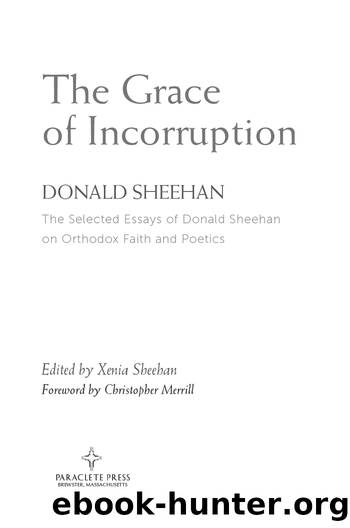The Grace of Incorruption by Donald Sheehan

Author:Donald Sheehan
Language: eng
Format: epub
ISBN: 9781612617015
Publisher: Paraclete Press
Published: 2015-01-15T00:00:00+00:00
In this context, then, let us reflect for a moment upon the sacred essence of psalmic poetry. In the fourth century, when the Nicene Creed was composed by two separate councils some sixty years apart, the Greek word employed by both councils to describe God the Father was poietes, âpoet,â usually rendered in English as âMaker.â Despite the rock-solid foundation in both Greek and English for âMakerâ as the proper rendition, the Greek word poietes carries primary meanings sometimes blurred by that rendition. To repeatedly profess our firm belief in âone God, Father all-mighty, Poet of heaven and earth, of all things visible and invisible,â is, I think, to disclose how very weakly and narrowly we usually conceive the essence of poetry. And in the light of the Creed, to conceive in weakness the essence of poetry is simultaneously to conceive in weakness the essence of God. Let us, then, explore the credal significance of poietes for a moment.
The key to the credal comprehension of the Father lies in the assertion of Godâs oneness of power to create distinct worlds, heaven and earth, each of which possesses both visible and invisible dimensions. Note very carefully: the invisible world of heaven also possesses a visible dimension while the visible world of earth also possesses an invisible dimension. The essence of the Fatherâs creativity may thus be seen as residing in His power to hold open four dimensions in two realmsâand in doing so in such a way that the Son of the Father becomes the fashioner of all things. The Fatherâs essence is thus at once exceedingly complex and divinely simple: complex, in the sense that the Father is steering four dimensions in two worlds at the same instant He is giving to His Son the power to create all things; simple, in the sense that the essence of such complexity is the action of loving.
Now, when we turn to the sacred essence of psalmic poetry, we can see how the complex simplicityâand the simple complexityâof the Fatherâs essence is perfectly expressed in the way wherein the diapsalmic intensities of the nine words are giving shape, in each of the twenty-two stanzas of Psalm 118, to two distinct worlds in four dimensions. That is, in Psalm 118, the nine words connect at every moment the heavenly âthouâ of the Father with the earthly âIâ of the psalmist; and this connection is, at every moment, being initiated and sustained by the Fatherâs divine invisibility unceasingly giving itself in love to the psalmistâs earthly visibilityâand this action of the Fatherâs love becomes at every moment incarnate as the psalmistâs song. âThy statutes have been my song,â says the psalmist (Ps 118:54)âthat is, the Fatherâs acts of self-emptying love have, in their essence, become incarnated in and as the actual shape of the psalmistâs poemâand they have done so (the psalmist continues in the same vein) â[i]n the house of my pilgrimageâ (ibid.)âthat is, in the actual dwelling place of the psalmist. To have
Download
This site does not store any files on its server. We only index and link to content provided by other sites. Please contact the content providers to delete copyright contents if any and email us, we'll remove relevant links or contents immediately.
Getting It, Then Getting Along by L. Reynolds Andiric(652)
Religion and Politics Beyond the Culture Wars : New Directions in a Divided America by Darren Dochuk(574)
Global Justice, Christology and Christian Ethics by Lisa Sowle Cahill(428)
Positive Psychology in Christian Perspective: Foundations, Concepts, and Applications by Charles Hackney(353)
Forgiveness and Christian Ethics by Unknown(347)
Douglas Hamp The First Six Days by Unknown(296)
The Horrors and Absurdities of Religion by Arthur Schopenhauer(270)
Insurgency, Counter-insurgency and Policing in Centre-West Mexico, 1926-1929 by Mark Lawrence(266)
Middle Eastern Minorities: The Impact of the Arab Spring by Ibrahim Zabad(249)
Christian Martyrdom and Christian Violence by Matthew D. Lundberg;(242)
The Oxford Handbook of Greek and Roman Mythography by R. Scott Smith;Stephen M. Trzaskoma;(235)
Beyond Heaven and Earth by Gabriel Levy(232)
God and Eros by Patterson Colin;Sweeney Conor;(230)
The Bloomsbury Reader in Christian-Muslim Relations, 600-1500 by David Thomas;(223)
Autobiography, Volume 2: 1937-1960, Exile's Odyssey by Mircea Eliade(215)
Witches: the history of a persecution by Nigel Cawthorne(211)
Cult Trip by Anke Richter(209)
An Introduction to Kierkegaard by Peter Vardy(198)
The Global Repositioning of Japanese Religions by Ugo Dessi(195)
